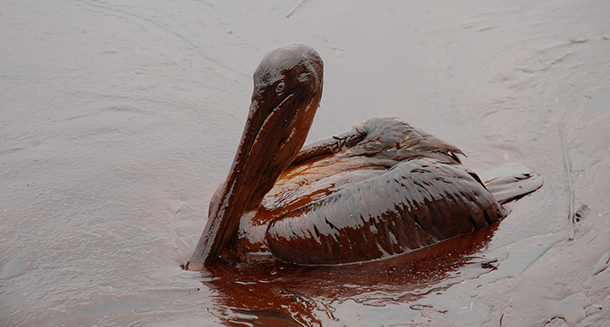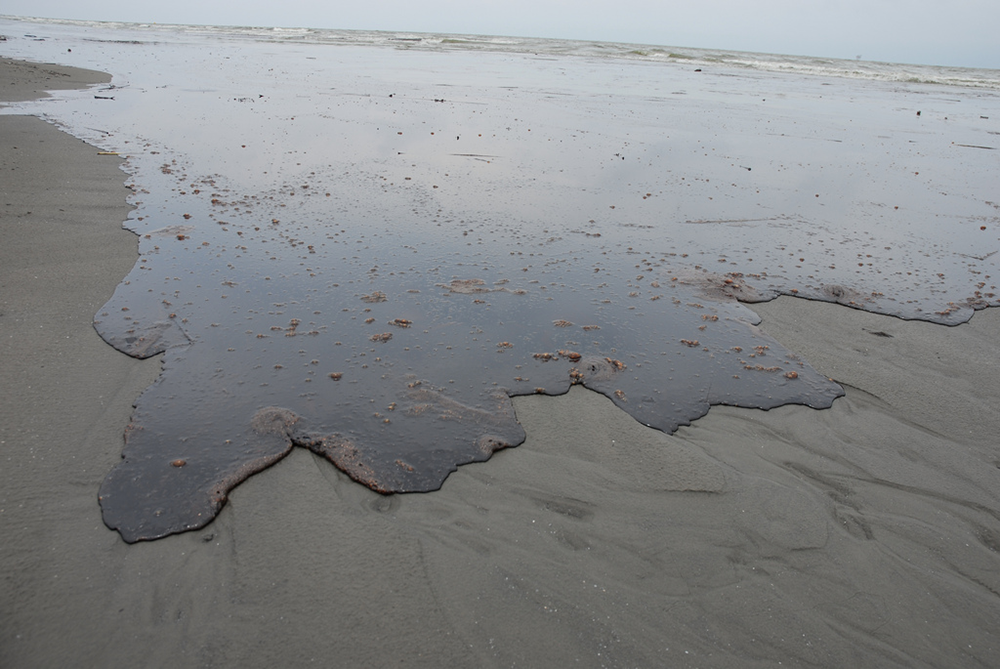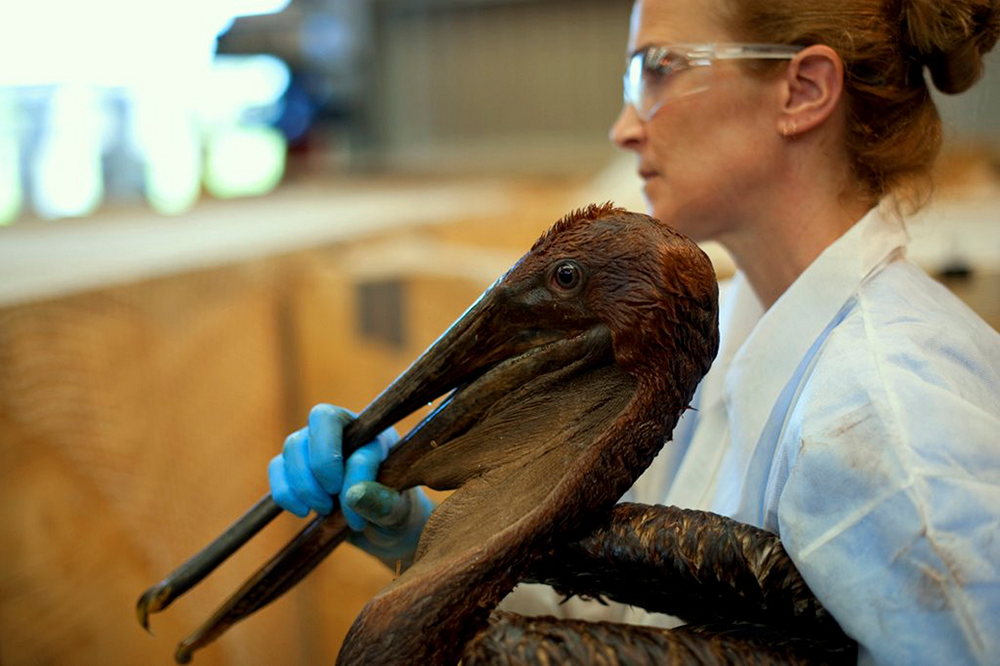British Petroleum Guilty of Gross Negligence
Air Date: Week of September 12, 2014

A brown pelican covered in oil as a result of the BP Deep Horizon oil spill. (Photo: Courtesy of Governor Jindal’s office/Louisiana GOHSEP; Flickr CC BY-SA2.0)
A Louisisan judge has ruled that BP acted with gross negligence in the lead-up to the 2010 Deepwater Horizon oil disaster. This means he oil giant may have to pay as much as $18 billion dollars in additional fines. Host Steve Curwood discusses what the verdict means and what the next legal steps are with Vermont Law School's Peter Parenteau.
Transcript
CURWOOD: It's Living on Earth. I'm Steve Curwood. A federal judge in Louisiana has found that the oil company BP acted with “gross negligence” in the case of the 2010 Gulf oil disaster, which could lead to fines of as much as $18 billion dollars on top of what BP has already paid. Pat Parenteau is a Professor of Environmental Law at Vermont Law School. He’s just returned from New Orleans, and we called him up to talk about the 120-page ruling from U.S. District Judge Carl Barbier. Welcome back to Living on Earth, Professor.
PARENTEAU: Thank you, Steve. Good to be back.
CURWOOD: So specifically, what the judge mean by "gross negligence" here?
PARENTEAU: Well, he used the word "reckless" and he pointed to a number of things that BP employees did or failed to do leading up to the disaster. And one event in particular was quite dramatic: Thirty-six minutes before the explosion, there were two BP employees on the phone, one on the rig, one in Houston, and they were looking at the pressure tests for the Macondo well. And the man on the rig said, "These numbers look squirly to me." But neither of these two individuals decided to retest the well, and the judge said that was the critical moment to have avoided the disaster.
CURWOOD: And what risks do the individuals involved run?
PARENTEAU: Well, both of these individuals have actually been charged with manslaughter, so their criminal trials are still underway.
CURWOOD: I gather “gross negligence” affects the penalties in a case like this. How does that work?
PARENTEAU: Right. So under the Clean Water Act, simple negligence results in a penalty of roughly $1,000 dollars per barrel of oil spilled. For gross negligence, the penalties are enhanced four-times to roughly $4,000 per barrel.
CURWOOD: So how does all that math affect what BP is going to have to pay?

Thick oil washes ashore Louisiana’s coast. (Photo: Courtesy of Governor Jindal’s office/Louisiana GOHSEP; Flickr CC BY-SA 2.0)
PARENTEAU: Well, the government claims that over four million barrels of oil went into the Gulf. BP claims it was closer to two and a half million barrels. Under the government's calculation, under the gross negligence finding of the judge, the maximum penalty would be $18 billion. Under BP's analysis or calculation it would be closer to $10 billion.
CURWOOD: So the judge has found BP liable for this, but now needs to figure out just what the penalty should be.
PARENTEAU: Correct. First he's got to determine what's the right figure in terms of barrels of oil that went into the Gulf, and then he has to apply a series of factors that are required by the Clean Water Act to determine what the final penalty would be.
CURWOOD: Of course, when all that happens, I'm assuming that BP will then appeal the ruling. Where could this case go from there?
PARENTEAU: Right. In fact, BP is probably going to try to appeal right away, even before there's a trial on the amount of damages. They'll take the liability ruling up to the Fifth Circuit Court of Appeals and argue that the judge misapplied the legal standard for what constitutes “gross negligence”. BP's arguing it's more like intentional and knowing and foreseeable acts, and the government is saying in light of the consequences of the spill, the failure to perform some of these critical tests on the well constitutes a lack of the kind of care that should be required when you're dealing with something as dangerous as the situation. So there's a real argument here about what exactly this term "gross negligence" means in the context like this. That's something the Court of Appeals could disagree with the District Court on, so we'll have to wait and see.
CURWOOD: Now, if you were defending BP, what would you think of the judge saying that the company's behavior had been reckless here?

A brown pelican is washed in the aftermath of the BP spill. (Photo: Brian Epstein/International Bird Rescue Research Center; Flickr CC BY 2.0)
PARENTEAU: BP's lawyers say, of course, that their conduct wasn't reckless. I think they're going to say that they had a test in front of them showing that the well was safe to operate, and it was only later that it was determined that that test was basically what you call a false positive: that in fact the well was not secure. And so the BP lawyers are arguing you're kind of doing a Monday morning quarterback on us. You're looking back in time at what happened literally minutes before the explosion, and you can't charge us with recklessness in a situation like that.
CURWOOD: $18 billion dollars. What does that mean to a company like BP? How much would it hurt?
PARENTEAU: Well, their share price declined by six percent with the announcement of this decision. It sounds like a lot of money, but I can't believe it threatens them with bankruptcy. You know, BP is obviously a major global company, and they had set aside $43 billion as a sort of total figure for all the different settlements they're involved in. There's still a natural resource damage case that hasn't concluded yet. They've settled with a number of the parties who were injured, but not all of them. They paid at least one criminal penalty, but now the looking at this other Clean Water Act penalty. So it's looking as if the figure that they thought they were going to be able to resolve this disaster with is not going to be enough money, but to a company like BP even an $18 billion dollar penalty is not really that dramatic.
CURWOOD: Pat, it already feels like this case is been going on for ages, the well blew out four years ago. How long before any of this money comes in?
PARENTEAU: Ultimately if we're talking about penalty amounts in the billions, certainly $18 billion that the government is seeking, BP will take that all the way to the Supreme Court just the way Exxon Mobil did with the Exxon Valdez case, and so ultimately the Supreme Court will have to decide whether whatever penalty figure is finally settled on is reasonable and within the discretion of the lower court. So it will take years, I think, before the dust settles on this.

Law Professor Pat Parenteau (Photo: Vermont Law School)
CURWOOD: Speaking of timing, how long was it before Exxon paid for the Exxon Valdez disaster in Alaska, and what portion of the award did the people actually finally receive?
PARENTEAU: Yes, so that was a $5 billion dollar award, and it took about almost a decade to get to the Supreme Court. And the Supreme Court chopped it all the way back to about $500 million and, of course, some of the claimants in the cases which were fishermen had actually died by the time the Supreme Court finally resolved the case, so they never saw any money. So it took an awful long time and it was much less than what people had been hoping for.
CURWOOD: How would this penalty money be used, assuming that the government eventually collects something?
PARENTEAU: Well, a lot of it's going to be used to restore some of the coastal wetlands and barrier islands that I saw when I was down there last week, at least that's what the officials in the state of Louisiana are hoping. Louisiana bore the brunt of the impact, of course, but also Mississippi and Alabama. And so a lot of this is going to have to go to restore oyster beds and barrier islands and wetlands as a way of trying to rebuild the fisheries that were impacted by this.
CURWOOD: How's the ecosystem doing, given the delay to get justice?
PARENTEAU: Well you know they keep finding these strange occurrences: the shrimp that don't have eyes, and dolphins washing up on the beach with great big lesions. So, you know, it takes a long, long time for the full effects of all these - not only the oil but the chemicals that were used to disperse the oil - all of that's working its way through the food chain, so we might not ever get to a point where we have a complete understanding of all the damage that was done to the ecosystem. But the courts are going to have to go ahead and make decisions probably before we find out everything.
CURWOOD: Overall how effective do you think our legal system is at dealing with these kinds of massive ecological disasters?
PARENTEAU: Well, dealing with them after the fact is not adequate, and we're drilling these wells in deeper and deeper water further off the Gulf. BP is been allowed to open new wells in the Gulf of Mexico. As long as we continue this reliance on oil, we're going to have these disasters, hopefully nothing as bad as this one, but oil spills and blowouts are chronic with this industry, and unless we get serious about transforming to cleaner, safer sources of energy, we're constantly facing a risk of disasters like this.
CURWOOD: Pat Parenteau is Environmental Law Professor at Vermont Law School. Thank you for joining us.
PARENTEAU: Thanks, Steve. Appreciate it.
Links
Judge Carl Barbier's full ruling
Living on Earth wants to hear from you!
Living on Earth
62 Calef Highway, Suite 212
Lee, NH 03861
Telephone: 617-287-4121
E-mail: comments@loe.org
Newsletter [Click here]
Donate to Living on Earth!
Living on Earth is an independent media program and relies entirely on contributions from listeners and institutions supporting public service. Please donate now to preserve an independent environmental voice.
NewsletterLiving on Earth offers a weekly delivery of the show's rundown to your mailbox. Sign up for our newsletter today!
 Sailors For The Sea: Be the change you want to sea.
Sailors For The Sea: Be the change you want to sea.
 The Grantham Foundation for the Protection of the Environment: Committed to protecting and improving the health of the global environment.
The Grantham Foundation for the Protection of the Environment: Committed to protecting and improving the health of the global environment.
 Contribute to Living on Earth and receive, as our gift to you, an archival print of one of Mark Seth Lender's extraordinary wildlife photographs. Follow the link to see Mark's current collection of photographs.
Contribute to Living on Earth and receive, as our gift to you, an archival print of one of Mark Seth Lender's extraordinary wildlife photographs. Follow the link to see Mark's current collection of photographs.
 Buy a signed copy of Mark Seth Lender's book Smeagull the Seagull & support Living on Earth
Buy a signed copy of Mark Seth Lender's book Smeagull the Seagull & support Living on Earth

